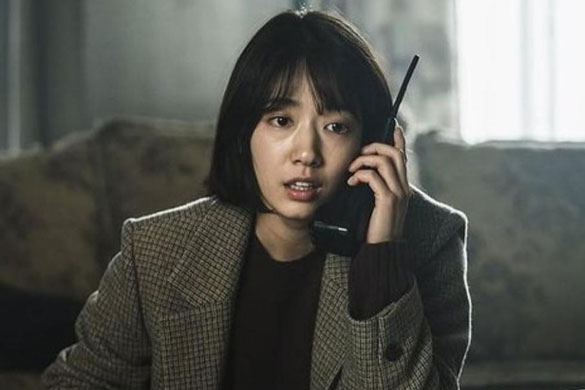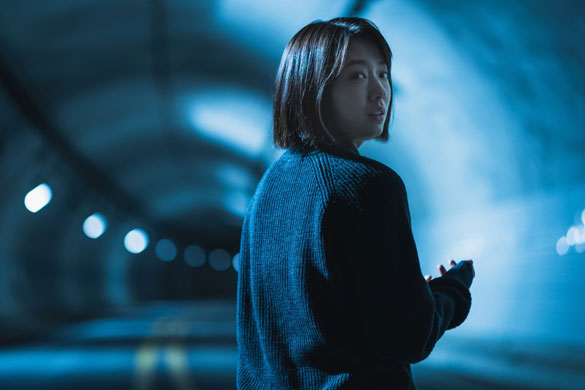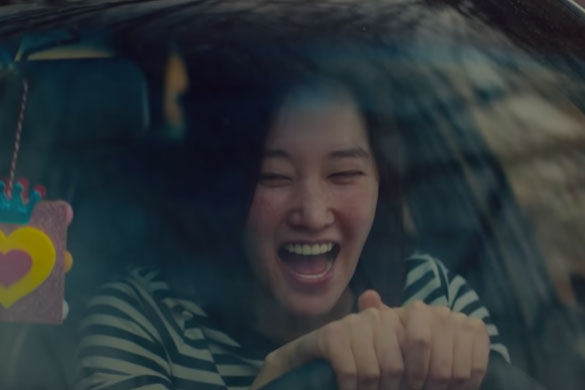
 |
||||
When her mother is admitted to hospital with a brain tumour, in the present day Seo-yeon (Park Shin-hye) grudgingly returns to the village she grew up in, still blaming her ailing parent for the death of her father years earlier. Before she even has a proper chance to settle back in to living in her childhood home, she begins to receive unsettling phone calls from a distraught woman of a similar age, Young-sook (Jeon Jung-seo), begging for help to stop her stepmother from abusing her, setting her on fire and trying to kill her.
Review: The Call opens with Seo-yeon trudging along a country road leading to her childhood village, dragging wheeled luggage behind her, when strawberry farmer Seong-ho (who will play an integral part in the later story) passes her in his van, picks her up and drives her to her family home, telling her “it’s still the best house in the village”. On entering the property, in spite of opening the curtains in the middle of the day the interior still has a gloomy, half-lit ambience within which dark, shadowy areas abound. Of course, this by its very nature sets an ominous feeling to proceedings from the outset and perfectly, creepily underlines how unsettling the wailing, often aggressive calls from the strange woman (we don’t yet know as Young-sook) screaming about her mother’s insanity and abuse of her are to already jaded Seo-yeon. However, equally important if not more so is how these imagery and atmosphere choices are used palpably throughout the film to not just reflect Seo-yeon’s mindset but actually stand as direct visual personifications of it:
Over the years, Korean cinema has flirted with stories of connections across time on a fair few occasions. While examples such as Will You Be There? (2016), My Mother the Mermaid (2004) and the like see characters either being presented with a way to physically travel to the past or inadvertently finding themselves there, from as far back as the New Korean Cinema wave of the late 90s and early 2000s through to recent years stories about characters connecting across two separate time periods through some otherworldly means are equally if not even more prevalent, whether the connection is via a mystical mailbox in Il Mare (2000); through a ham radio signal across time in Ditto (2000); The Gingko Bed’s (1996) enchanted bed (obviously); Failan’s letters linking a man to the already deceased love of his life, a woman he has never met; or more recently Time Renegades' (2016) characters in different decades connecting through their dreams.
The Call’s individual scenes move at a measured pace while the overall narrative unfolds and progresses fairly briskly. This deft scene restraint allows ample time for character personalities and traits to be seemingly fully shown before, in the case of one individual, being revealed as a case of ‘you can’t judge a book by its cover’ and ensures that the many twists, turns and contentions presenting can be easily followed throughout (especially well thought out considering the fact that they’re fairly involved and deal with two separate timelines running concurrently and equidistantly forging forward) and indeed as the narrative briskness ramps up yet further as we approach and enter the pulsing story culmination, the separate timelines and the changing effect of one on the other constantly and swiftly being switched between, are perfectly clear with no risk of viewer confusion despite the timelines' cause and effect intricacy. That early scene measured pace also works hugely in favour of actresses Park Shin-hye and Jeon Jung-seo’s portrayals of Seo-yeon and Young-sook, again allowing the time to make the characters feel fully fledged. I’ve long been a fan of Park Shin-hye and here, as always, she hits every mark to perfection in a perfectly natural, beautifully understated manner. However, it is Jeon Jung-seo’s astonishing portrayal of troubled Young-sook that knocks the ball not only out of the park but right into the stratosphere too – all the more impressive when you consider the fact that Yeon Jung-seo’s only prior professional acting work was in a supporting role in Lee Chang-dong’s Burning. In short, her portrayal of Young-sook in The Call is an absolute tour de force performance that is not only memorable to the point of being absolutely unforgettable but also one of the major, major strengths of an already strong, gleefully twisted horror/thriller.
THE CALL (콜) / 2020
|
||||
All images © Next Entertainment World, Yongfilm, Netflix Review © Paul Quinn |
||||



